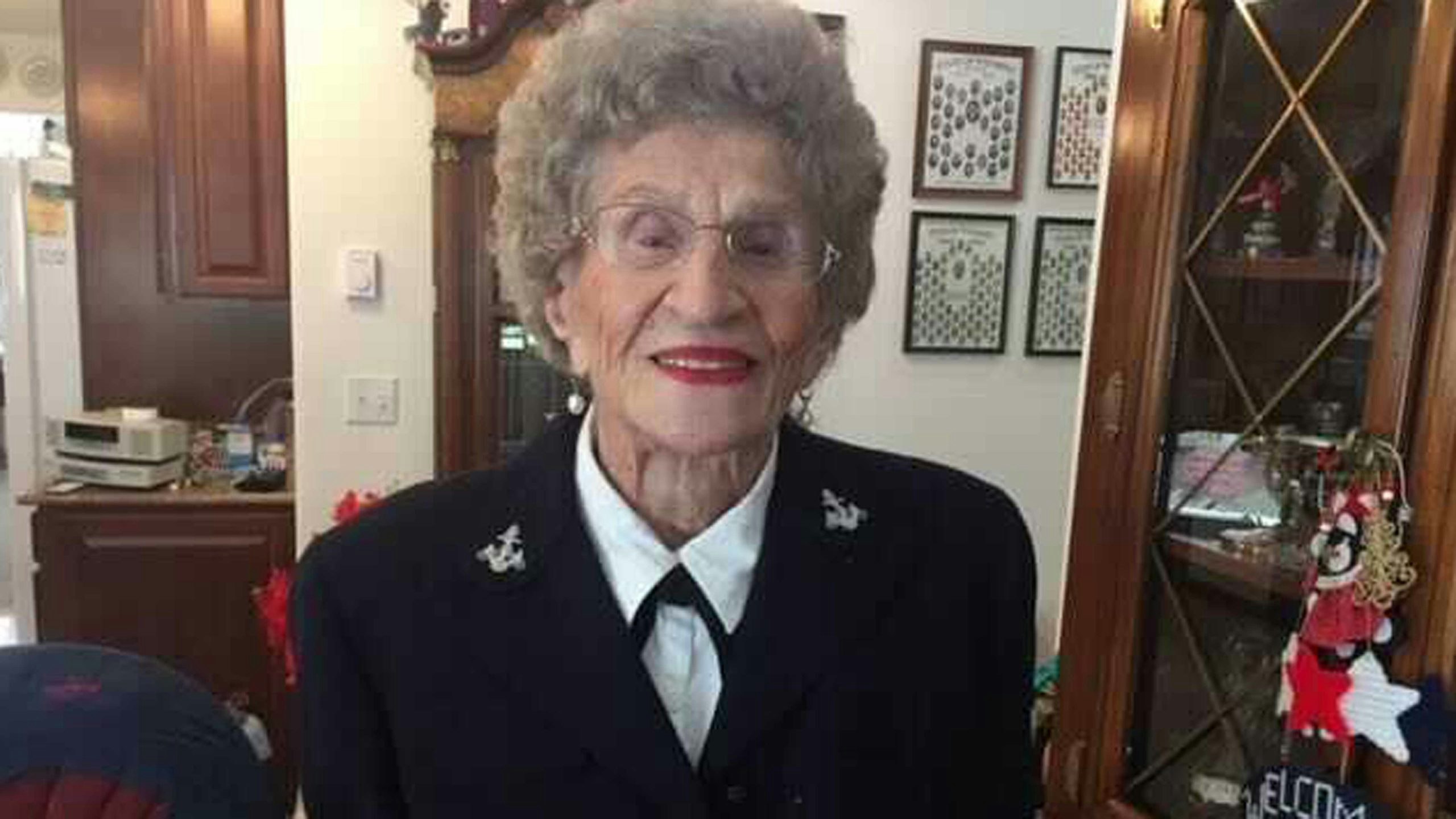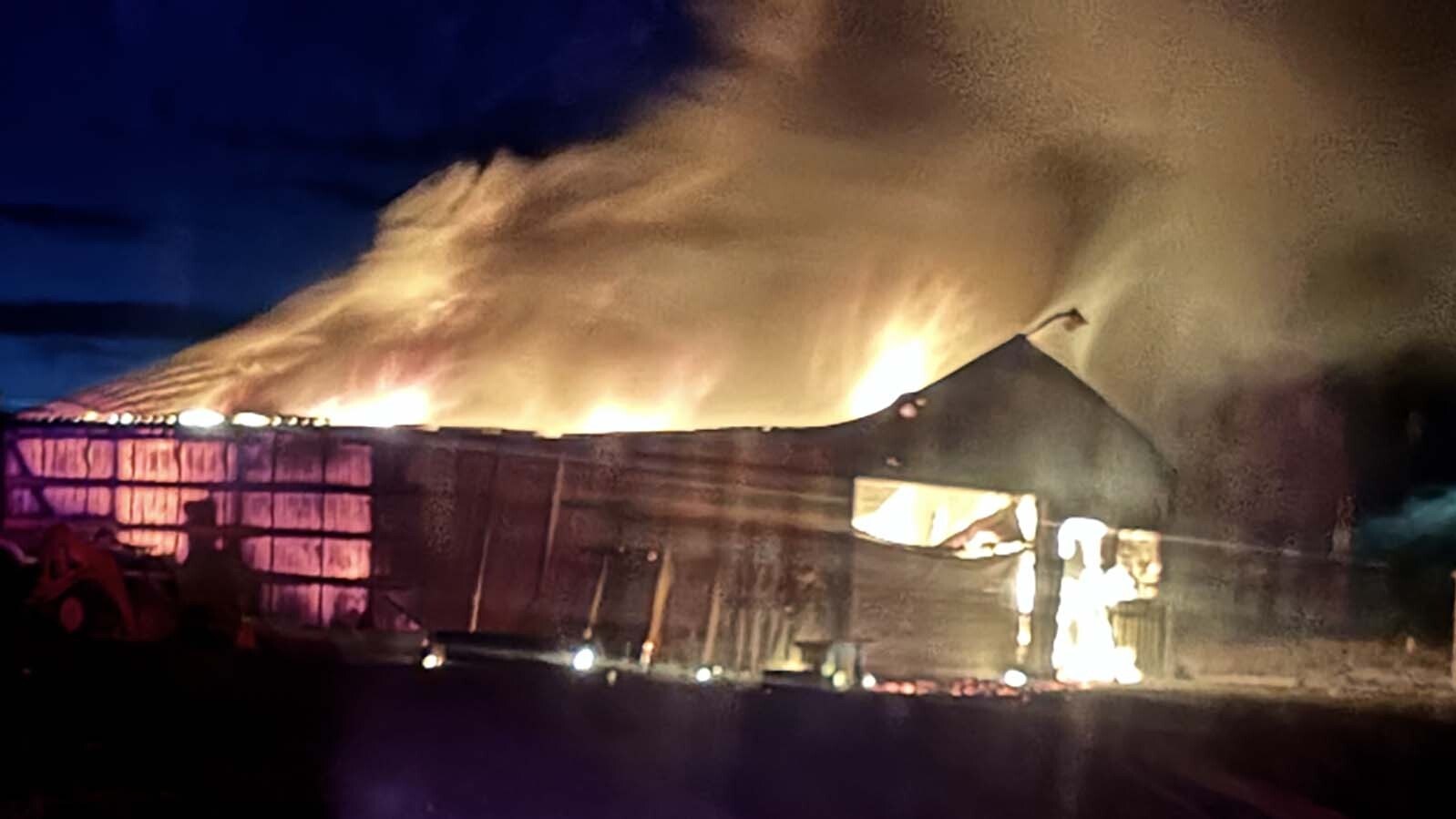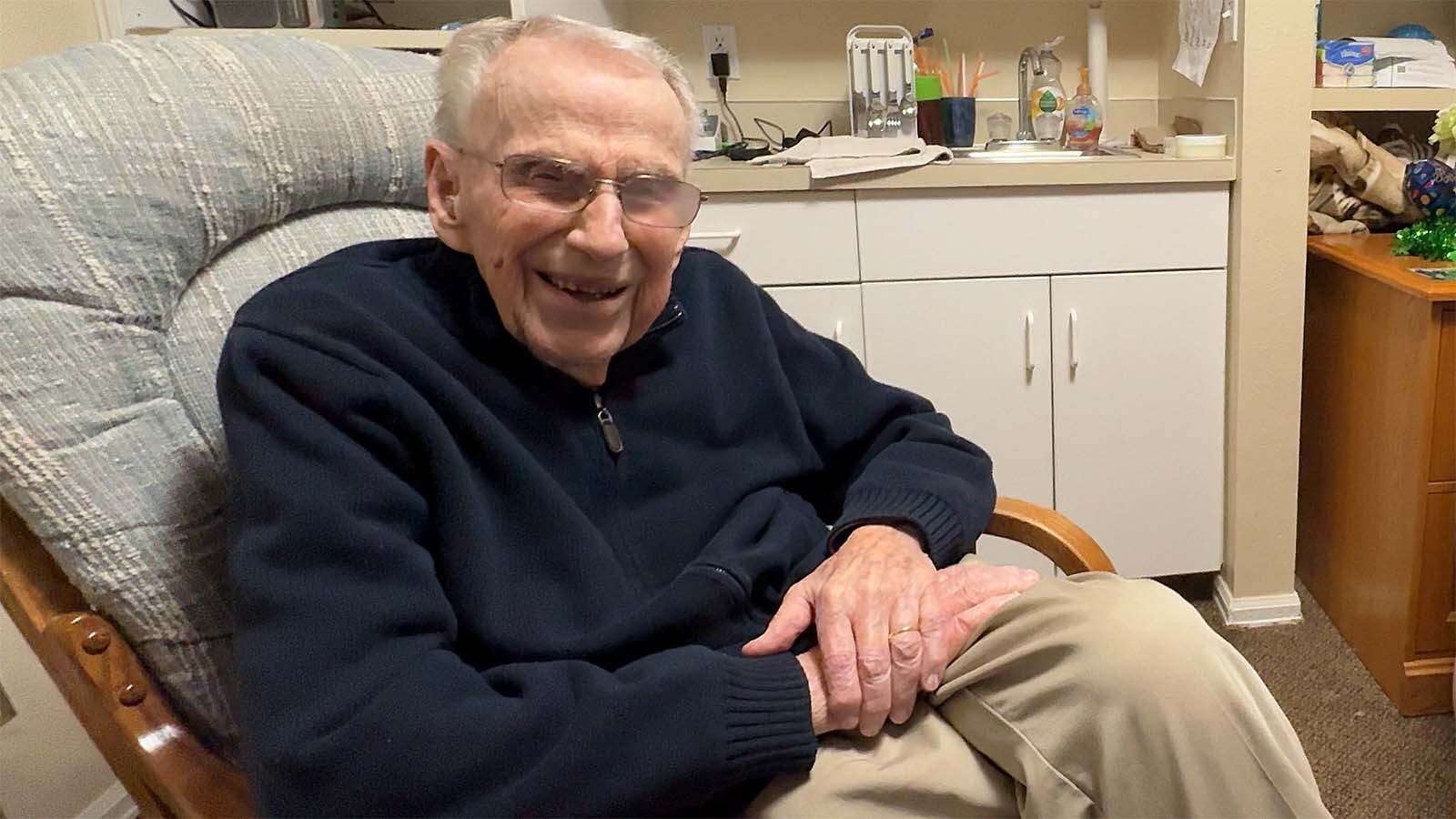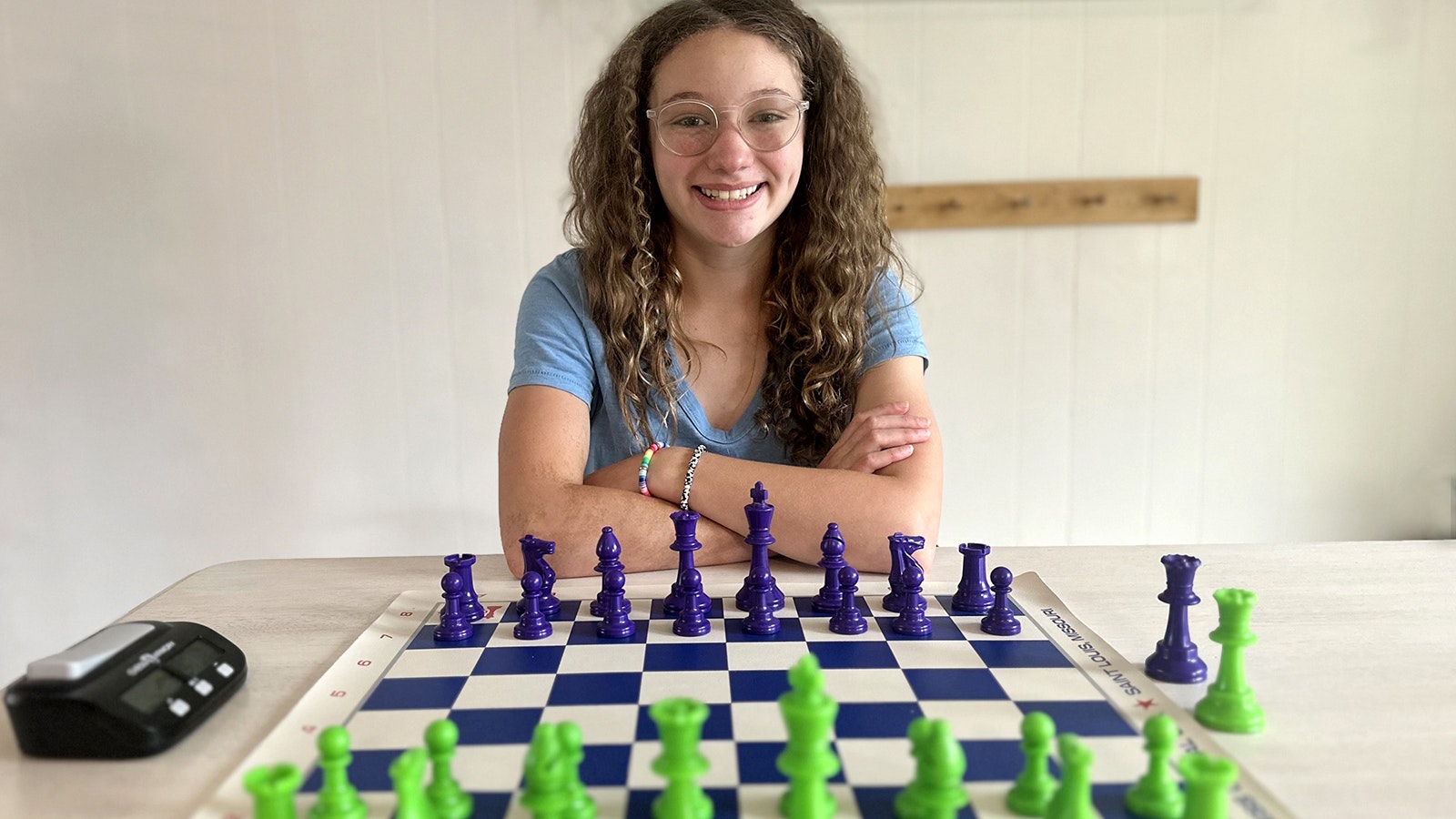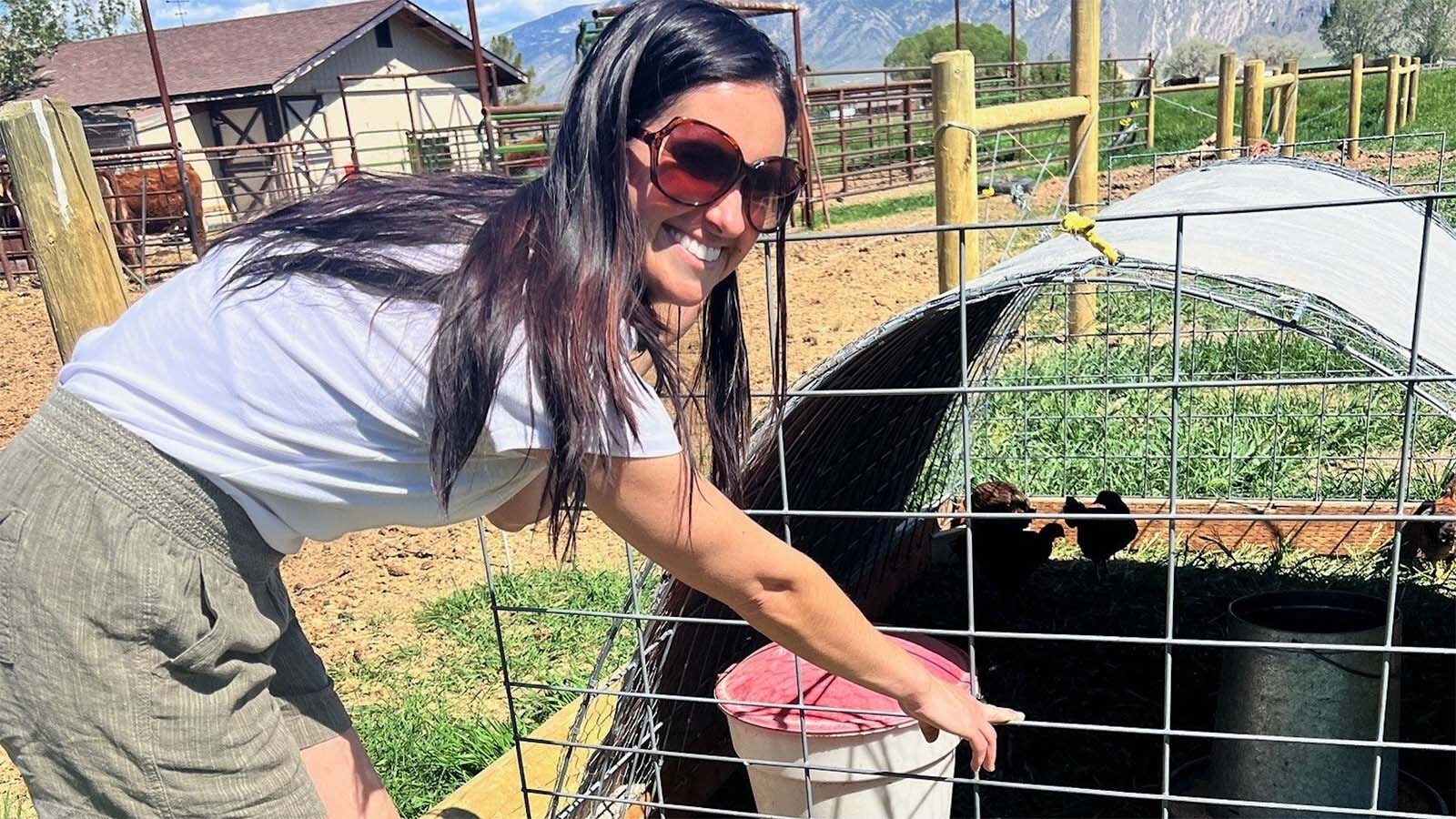On a frigid winter evening in 1920s Hudson, about midway between Lander and Riverton, a Serbian mother bundled her daughters and sent them out to deliver Christmas food to their neighbors, especially the ones who didn’t have enough to eat.
If the baskets full of homemade bread, chicken, grapes and wine didn’t buckle the girls’ knees, then the chill would, but they knew that when the task was done, their mother would unbind their scarved faces and hand them twin mugs of hot chocolate.
That’s the small-town Wyoming that Dessie Bebout remembers as she approaches her 102nd birthday on Aug. 15..
And she wouldn’t have it any other way.
Town Holiday
In honor of a life that saw her feed the hungry and care for the sick in Shoshoni, as well as serve in a special military program for women in World War II and almost become a licensed pilot, Hudson Mayor Mike Anderson on May 30 declared a new town holiday: Dessie Bebout Day.
“Bebout represents the epitome of service to our community and nation, a debt of gratitude we can never repay,” reads the mayoral proclamation, which was presented in the Hudson Town Hall on a rainy Memorial Day.
“It was such a total surprise,” said Bebout of the event. “I thought, ‘My gosh, am I dreaming? Am I hearing things? Is there something wrong with me?’ I was not expecting it.”
Lights In Hudson
It started with a tough couple and a midwife.
Dessie Bebout, formerly Dessie Svilar, was born in a Hudson home to Bessie and Dan Svilar in 1920, with the help of an Italian midwife named Mrs. Delpiccolo.
Because no birth certificate was issued, when Dessie Svilar tried nearly 23 years later to join the military, she asked Delpiccolo to verify the fact of her birth – and the midwife did, from her deathbed.
Dessie was the fourth of eight children.
Her father Dan Svilar came to America from Yugoslavia in 1904, bearing a tag that said he was heading to Hudson and not able to speak a single word of English.
In the years to come, he made Wyoming history by bringing electricity to Hudson and running its first power company, where the average light bill was 60 cents a month in the early 1920s.
But first, he had to make music.
Fresh from Yugoslavia, Svilar was found his brother Eli in Hudson. While running errands, Eli made the mistake of leaving Dan to wait for him on the streets of Hudson for just a few minutes too long.
A piano strain lured Svilar from the street — and into the town’s famed brothel.
“He saw a piano in there and he heard music,” said Dessie, recounting family lore. “And I could not believe it – papa went in there! And somebody played a melody, then got up, and papa sat down there and played the same melody, just by ear.”
Svilar filled his years with hard work and big risks. He worked his way into part ownership of the Buckhorn Bar (now Svilar’s Bar and Restaurant) and started a farm, a creamery, bakery, cigar manufacturing company, ice company, and of course the power company, which was established in 1920, the year of Dessie’s birth.
The family controlled the power company until 1988, when they sold it to Pacific Power.
All of Dan Svilar’s ventures succeeded because, Bebout’s daughter Ruby Calvert said, all the Svilar children shared in the hard work.
Fate And Newspapers
Bebout’s mother was a mail-order bride sent from Yugoslavia in 1909 at age 14 to marry a Nebraska railroader named Joe Mastalica.
With nationalistic tensions in Europe foreshadowing what would become World War I, Mastalica sent a letter to the mayor of Bessie’s town in Yugoslavia asking for a young Serbian girl to come and marry him. The letter also contained a passage ticket to the United States.
The girl crossed an ocean and a prairie to meet her husband. She spent three years and gave birth to two children in a “miserable” box car in Nebraska before losing Mastalica, who died of blood poisoning, Calvert said.
Bessie, alone in a new country at 17 with two children, made a unique purchase: advertisements in a Serbian newspaper inquiring after her brother, who had come to the states as well.
Bessie found her brother in Rock Springs and traveled to Wyoming.
When spending time with mutual friends in Hudson, Bessie met Dan Svilar and married him in 1916.
Boarders And Bums
Bebout remembers her mother like the warm glow of Hudson’s first light bulb.
“My mother was always so kind,” she said.
Constantly working, butchering, cooking and baking on the farm, Bessie Svilar wouldn’t let anyone go hungry.
“Mama” sent her daughters into the town, especially the impoverished Italian-Ville where two of their favorite teachers lived, to deliver Christmas food baskets.
For tramps hobbling off the train, Mama Svilar’s generosity was legendary. She fed the many boarders who lived with the family and looked after her own children with an intense resourcefulness.
“We never knew who was going to come to our house, but mama never, ever turned anybody away,” said Bebout, adding that kindness was widespread in those days, especially in small towns. “People were always willing to help. That’s the thing that was so beautiful about Hudson.”
Kitchen Explosion
When she was still in the eighth grade, Bebout and her older sister Sophia had to fill their mother’s shoes.
Bessie Svilar had been bustling in the kitchen when the gas stove blew up.
“And I turned around, there my mother was – on fire,” Bebout remembered.
The girl rushed to the kitchen sink, gathered water and threw it on her mother, who was screaming and wailing. She then ran to the pool hall where her father was, and he took his wife immediately to a doctor in a neighboring town.
There were no doctors in Hudson.
Bebout’s mama was sent to the Mayo Clinic for nearly a year and was unable to turn her head due to scarring on her neck. Eventually, doctors were able to graft skin onto her neck to restore some of her motion.
She reveled in the smallest recoveries.
“It was a new world for her again, and she joined back with us, and mama did so much in that town,” said Bebout. “There was never a hunger.”
In Flight
A witness to her mother’s courage, the young Dessie Svilar in her late teens scraped together money from her wages to take flying lessons.
When she was ready to fly solo for the first time and win her license, the local newspaper, the Riverton Review, featured a story about Dessie and the upcoming solo flight.
“Papa” Dan Svilar saw the newspaper.
“He just became hysterical. He said ‘What are you doing? You’re not doing that,’” Bebout remembered. “And Papa stopped it.”
Bebout’s father was a stickler for Eastern European traditions placing women in the home, in dresses, caring for children.
She still regrets not earning her pilot’s license, but it was this conflict that gave her the determination about four years later to join the U.S. military during a war.
WAVE For The Girls
In July 1942, U.S. Congress passed a law establishing a women’s division of the U.S. Naval Reserve, called “Women Accepted for Volunteer Emergency Service,” or WAVES. The law was enacted to free up Navy officers and sailors for sea duty, replacing them with women in the “on-shore” positions.
The first WAVES rolled out that August. In January 1943 Dessie Svilar, who had been working as a civilian at the Fort Warren base in Cheyenne, enlisted in the Navy.


“My brothers… all had joined the service,” she said. “They weren’t drafted, they volunteered. And I thought, ‘My brothers are in there, I’m just working here at Fort Warren doing travel orders for different soldiers. And I can do that as a vet.’”
Goaded by an over-eager military solicitor, she passed her entry exam and physical with ease and was told to report to Hunter College in New York to become an official WAVE.
She knew her father wouldn’t like it.
“But, you know, I’d pleased Papa all my life. And this was something I wanted to do, so I said ‘Sure, I’ll sign up,’” Bebout said.
Beautiful Voice Ringing
Bebout’s barracks mates at first resented her because she was one of only five women among hundreds of WAVES who could take shorthand notes, earning her a soft secretarial job that began at the luxurious hour of 8 a.m.
“So I told them, ‘I’ll even the score out. I will be responsible for clearing our rooms and the toilet and I promise you, we will never be suspended for a weekend,’” she recalled.
And she kept her word during the whirlwind two months of training in New York City, where the locals wanted to pay for all the WAVES’ dinners.
It was also there that one of Bebout’s first friends in the military, Ira Jean, filled the barracks with her beautiful, operatic voice.
Somewhere in a vivid reel of memories, Bebout can still hear her friend singing.
Military Marriage

All was not cozy when Dessie Svilar reported in Seattle for her first WAVES job ordering Merchant Marines to active duty, as some of the men in leadership disliked the new ranks of girls and doubted they could handle their duties.
But it was also while she adjusted to military life in Seattle that Hugh Bebout, an acquaintance from Wyoming and a friend of her brother’s now serving in the Air Force, took her out to dinner on his way from his post in Alaska to his new station in Texas.
The pair wrote letters for a few months until one day, Hugh called Dessie and proposed.
“And I said ‘All right,’” she remembered with a smile.
The couple married in El Paso in 1943, but they were never stationed in the same place.
Dessie Bebout qualified to become a Naval officer in 1945 and was on her way to Florida to be promoted when her husband called and said “Pack your clothes and come home. You’re going to be discharged.”
Hugh Bebout had become eligible for discharge that year and, under an order of the time, military wives were discharged with their husbands.
Shoshoni Mom

The pair had four children of their own: Eli, Ruby, Nick and David. They also raised their niece, Bessie, and nephew Michael, ages 8 and 3.
Dessie and Hugh’s youngest son “Davy” died at 18 months after being run over by a car.
The memory is still a horrific one for Bebout, who with her arms showed how she carried Davy to the family business, a bar in Shoshoni, and begged a complete stranger to drive them to Riverton.
“I don’t even know who she was, but she did (drive us). But my boy was gone.”
Bebout was devastated.
But life kept calling, so she had no choice but to keep answering.
“Life wasn’t easy then, but there were so many days that were beautiful, they’ve pushed the harsher memories into the background,” she said.
Bebout threw herself into the community.
“If something came along, and here was a need, I’d try to fill it,” she said.
Bebout created the strep throat testing program in Shoshoni. She turned an empty room in the Shoshoni school into a proper sickroom with cots, so that feverish children wouldn’t have to hunker on the floor until their mothers came for them.
And on those cots, made up tightly, were Bebout’s wool blankets from her Navy days.
She cooked for her own children and welcomed any stragglers: neighbors, friends, kids who’d missed the bus home.
Hugh and Dessie Bebout from 1952 to 1954 built the Boysen Marina, which remains an icon of summer recreation in the region. After eight bitter winters on the lake, the family sold the Marina in 1960 and returned to Shoshoni.
Bebout served as Fremont County Election Judge for 25 years, was Shoshoni Chamber of Commerce treasurer for 17, Shoshoni Post Master from 1967 to 1981, and gave her talents to numerous other organizations, including the Veterans of Foreign Wars Women’s Auxiliary and the Riverton Chapter of Does, in both of which she’s still a member today.
Different Kind Of Army
The ranchers’ and farmers’ wives of Shoshoni and the valley villages around it were their own kind of military. Everyone kept track of everyone’s kids, and everyone pitched in to host banquets, dances, and fiddle contests. People looked after one another.
“It was just good, clean living,” Bebout said. “It was a wonderful life, it truly was, and I’m still here!”
Onward

Dessie’s children have all gone on to make names for themselves both inside and outside of Wyoming.
Bebout’s firstborn Eli is best known as a long-serving state senator and representative for Riverton’s urban district, now retired from the seat.
As chair of the Senate Appropriations Committee, Bebout oversaw funding of the new Shoshoni School, regarded as one of the finest school buildings in the state, as well as the Central Wyoming College McFarland Health And Science Center and numerous other projects throughout Wyoming.
Eli Bebout and his brother Nick have successful oil drilling businesses together.
Nick Bebout also played college football on a scholarship for the University of Wyoming and was drafted to play professional football. He logged three years for the Atlanta Falcons, four with the Seattle Seahawks and one for the Minnesota Vikings before retiring from the game to join Eli in business.
Ruby Calvert, formerly Ruby Bebout, moved to Riverton after earning a bachelor’s in secondary education from UW. She went to work for Central Wyoming College’s public television station as programming and production director. After 25 years in the position she became interim general manager, then general manager a year later in 2007, and retired in 2015.
After 102 years, Bebout has unlocked the secret to life — treasure all of its moments.
“Harbor every experience, because when you get to be 102, you know, (you’ll) sit and reminisce and think of the wonderful times,” she said.

